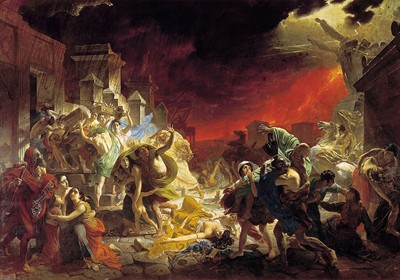
To see the previous installments, click on the following links: #1, #2 , #3, #4, #5, #6, #7, #8, #9, #10, #11, #12, #13, #14, #15, #16, #17, #18, #19, #20, #21, #22, #23, #24, #25, #26, #27
It was a tense night in our small flat on the Via della Abundanza. From the half-open window, the sea breeze still carried the echo of the activity that never seemed to die down in Pompeii. I looked at Aemilia, sitting by the fire, and felt that every word I was utter about our future would break something in her spirit. I loved her so, so much... and she loved this city that had brought us together and that, in some way, defined us both. How to explain to her that it was necessary to leave it? How to tell her that Pompeii, our Pompeii, was doomed to be devoured by a force impossible to stop?
Aemilia looked at me, her dark eyes reflecting a deep sadness mixed with disbelief. “Hispanus,” she murmured, “how can you even think of leaving Pompeii? Here we have found our freedom, our livelihood... our love. This city has been the beginning of it all. Is it not also right that here, in the place that gave us a new life, we should meet our end when the time comes?”
I felt the weight of her words. There was in her voice the same dedication she showed day after day in our bakery; the love rooted in every street of this city vibrated in her. I knew that my words went against every beat of her heart.
“Aemilia, my beloved, I swear I understand what you feel. Pompeii has been our refuge and our blessing, and to leave it is as painful for me as it is for you..... But I assure you something terrible is coming. Vesuvius is a sleeping beast, and I have seen the future, or dreamt it, so clearly that I cannot doubt: a river of fire will sweep through this city. Its people, its streets, everything we know will be buried in eternal silence.”
She looked away, letting out a long, deep sigh. “To where, Hispanus? To a life without roots, without the smell of bread, without these streets? Pompeii is all we have, how can we abandon a place that has given us so much?”
The dilemma seemed insurmountable. Abandoning this life we had built together was like tearing off our very skin. And yet, a protective impulse made me insist. “Aemilia, I don't want to see the beast end this peace we have found. We will flee to any place where there is hope of life, where we are together. I do not wish to lose you in a catastrophe I can avoid. If we must start again, we will, but we will do it alive.”
There was a long silence. She searched my eyes with a serene firmness. “And is not this peace something worth defending to the end? If life is to end, let it end here, in the place we know and love. If our destiny is to merge with Pompeii, then... perhaps we must accept it.”
That instant hung in the air like an unanswered question. A strange, dark foreboding hung between us, like a disembodied shadow, a crack that crossed our souls. I, Hispanus, a man who had seen the future, was powerless before the strength of his love for Pompeii. I looked at Aemilia and saw in her a part of this city, untamed and proud, and I felt that the weight of deciding between life and the fate of days had separated us into opposite worlds.
To be continued
Header Image:
The Last Day of Pompeii, a work executed by Karl Briulov between 1830 and 1833. Oil on canvas, 456.5 x 651 cm, on display at the St. Petersburg State Museum, Russia.
It’s incredibly frustrating that she can’t understand, but if he has decided to share the same fate as Pompeii with her, perhaps it can’t be helped. I truly wonder how things will turn out.
QUESTION: In ancient Rome (and ancient Etrusia) weren't shamen who could see the future? Perhaps Hispanus does not have to be from the 20th Century: he could be an ancient druid who sometimes had mystical glimpses into the future. Many ancient societies have tales for soothsayers who have visions of the future.
It is the tragedy of fate, Yumi ( @yumiyumayume ). I imagine Japanese farmers and fishermen in the aftermath of the Fukushima tragedy. After the 2011 earthquake and tsunami, which triggered the nuclear disaster at the Fukushima plant, some local people, especially elderly people, decided to stay in their homes despite the radiation risk. Many of them claimed that they were too attached to their land and their lives to leave. For some, their ancestors had lived in those places for generations, and they preferred to accept the dangers rather than leave their family's home and legacy behind. Thank you very much for reading this little storyteller.
The little story of a murder in Pompeii is coming to an end, Tim ( @T-Newfields ). The protagonist (Hispanus) is a time traveler but he tries to hide it in order not to be misunderstood and not to change the historical events.
And yes,… in Rome there were oracles. The most famous was the Oracle of Apollo in Cumae but this will possibly be a plot for another story...:)
I sincerely thank you all for your disinterested reading and correction of errors.
What you mention is so true. Some people never leave the places even though they are always affected by typhoons.